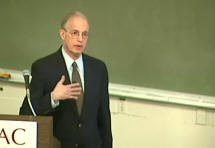
Handy Links
SLAC News Center
SLAC Today
- Subscribe
- Archives: Feb 2006-May 20, 2011
- Archives: May 23, 2011 and later
- Submit Feedback or Story Ideas
- About SLAC Today
SLAC News
Lab News
- Interactions
- Lightsources.org
- ILC NewsLine
- Int'l Science Grid This Week
- Fermilab Today
- Berkeley Lab News
- @brookhaven TODAY
- DOE Pulse
- CERN Courier
- DESY inForm
- US / LHC
SLAC Links
- Emergency
- Safety
- Policy Repository
- Site Entry Form

- Site Maps
- M & O Review
- Computing Status & Calendar
- SLAC Colloquium
- SLACspeak
- SLACspace
- SLAC Logo
- Café Menu
- Flea Market
- Web E-mail
- Marguerite Shuttle
- Discount Commuter Passes
-
Award Reporting Form
- SPIRES
- SciDoc
- Activity Groups
- Library
Stanford
Around the Bay
Harold Shapiro Presents EPP2010 Report
 Particle physics is on the threshold of major scientific discoveries, but unless the United States takes
prompt action, it risks being left out.
Particle physics is on the threshold of major scientific discoveries, but unless the United States takes
prompt action, it risks being left out.
This was the message of Harold Shapiro, acclaimed economist and chairman of the National Academies Committee on Elementary Particle Physics in the 21st Century (EPP2010). "Particle physics is at a crossroads," he told a lecture audience of approximately 300 at the Panofsky Auditorium on Friday.
In his talk, Shapiro summed up the conclusions and recommendations of the EPP2010 committee, which was formed in 2004 to identify compelling questions in elementary particle physics and recommend a prioritized implementation plan to address them.
In its report titled "Revealing the Hidden Nature of Space and Time—Charting the Course for Elementary Particle Physics" released on April 26th in Washington, D.C., the committee unveiled a 15-year plan for the future of U.S. participation in particle physics.
The EPP2010 committee's unusual feature was that less than half its members were particle physicists—the others were experts from a variety of other fields including genetics, aerospace engineering, and economics. The non-particle-physicists were initially skeptical of the value of investing in particle physics, Shapiro said. But by the end, he said, everyone was convinced of the intellectual vitality of the field and excited about its potential to advance the frontiers of science.
In order to remain a leading player in particle physics, the U.S. will have to invest a large amount of "risk
capital," Shapiro said. This capital would be needed to act on the following six priorities identified by the
EPP2010 committee:
(1) Continue being an active partner in the Large Hadron Collider (LHC) being built in Switzerland.
(2) Establish a major R&D program to achieve readiness for the proposed International Linear Collider (ILC).
(3) Mount a compelling bid to host the ILC in the U.S.
(4) Coordinate efforts at the interface of particle physics, astrophysics and cosmology.
(5) Establish a staged program in neutrino and proton decay research.
(6) Participate in precision probes of physics beyond the standard model.
Many U.S. experiments in particle physics are nearing the end of their life cycles, Shapiro said. Without a commitment from the government, the U.S. share in the field could decline to half its size in a decade. "The center of gravity will shift to Europe and Japan," Shapiro said.
Shapiro stressed the importance of strategic partnerships with other countries in future particle physics projects. He said that instead of asking foreign partners: "We are going to build this, will you help us?," we should ask: "What can we best build together?"
—Chandra Shekhar SLAC Today, May 8, 2006